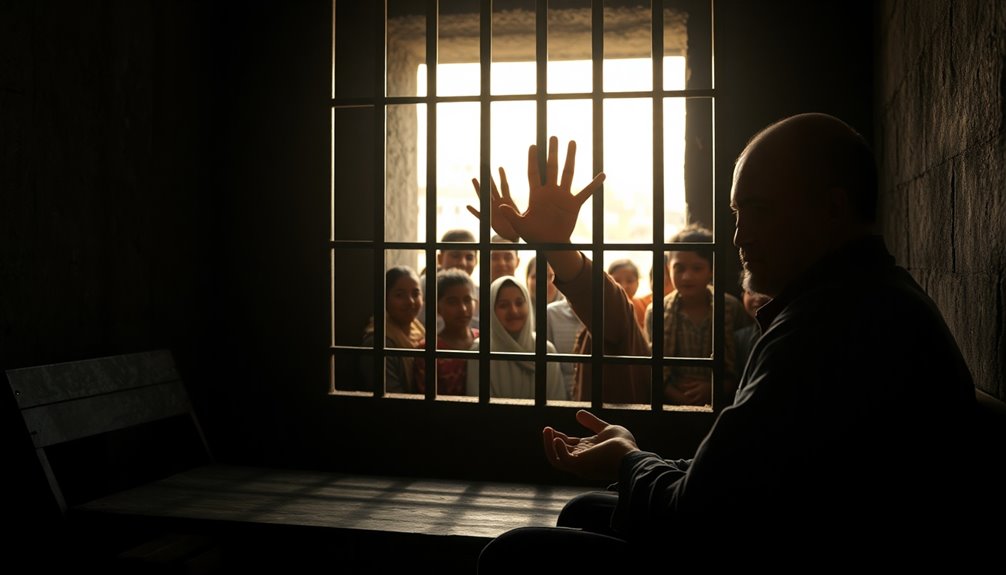In A Lesson Before Dying, you see the powerful intersection of justice and redemption through Jefferson's tragic story. Wrongfully accused, he confronts deep racial injustices within a biased legal system. His journey reflects a struggle for dignity as he evolves from despair to self-acceptance. Mentorship from Grant plays an essential role, as their interactions reveal the importance of personal connections in fostering growth. The supportive community surrounding them adds another layer, emphasizing shared responsibility in the face of injustice. This exploration of hope and transformation highlights the resilience of the human spirit, leading to deeper insights as you explore further.
Racial Injustice in the Legal System

Racial injustice permeates the legal system, particularly evident in Jefferson's trial, where systemic racism leads to his wrongful conviction for murder. As you examine the details, it's clear that the all-White jury's biases and preconceived notions about Black individuals play a significant role in Jefferson's dehumanization. This situation echoes the experiences of individuals like Ida B. Wells, who fought against systemic oppression and sought justice for marginalized communities.
This atmosphere of racial injustice doesn't just affect him; it reflects the broader societal prejudices deeply embedded in the legal system of 1940s Louisiana. The tragic events surrounding his case echo the systemic oppression faced by marginalized individuals in literature, such as in Richard Wright's *Native Son*.
During the trial, the derogatory comparison made by the defense attorney, likening Jefferson to a hog, starkly illustrates the dehumanizing attitudes prevalent in legal proceedings against Black defendants.
The rapid pace of the trial and the lack of fair representation further highlight the failures of the judicial system to uphold justice for marginalized communities.
Miss Emma's desperate pleas for justice, coupled with the community's collective outcry, reveal a profound neglect and indifference toward Black lives within this legal framework.
As you consider these elements, it becomes evident that Jefferson's wrongful conviction isn't an isolated incident but rather a symptom of a much larger, systemic issue that demands urgent attention. The courage shown by individuals fighting against such injustices reflects the legacy of resistance movements that continue to inspire collective action today.
The Quest for Redemption
In the quest for redemption, you see Jefferson's spiritual transformation as he moves from despair to self-acceptance. Grant's role as a mentor is essential, guiding Jefferson towards dignity and highlighting the power of personal connections. This journey shows that redemption isn't just about surviving; it's about reclaiming one's integrity amidst injustice. Coates' exploration of systemic racism reveals the broader societal issues that impact individual journeys toward redemption. The story echoes the themes of resilience against adversity, illustrating how personal struggle can lead to profound change. As seen in immigrant experiences, navigating systemic challenges often requires immense bravery and perseverance.
Jefferson's Spiritual Transformation
Jefferson's spiritual transformation unfolds as a profound journey from despair to dignity, marked by his initial feelings of hopelessness after being wrongfully convicted. You see him at first, believing he's a "hog," stripped of worth and identity. This sense of dehumanization weighs heavily on him, but through the process of mentorship provided by Grant, he begins to reclaim his humanity.
As you follow Jefferson's journey, you witness how he slowly recognizes his intrinsic worth. With each interaction, he learns that he deserves to stand tall, even when faced with an unjust fate.
The pivotal moment occurs when Jefferson expresses a desire to die with dignity. This marks a significant shift—he starts to accept himself and acknowledges the importance of his identity, despite the societal injustices he's endured.
Jefferson's transformation culminates in his final act of defiance against the oppressive system, choosing to embrace his fate with courage and resolve. He inspires those around him, challenging the dehumanizing perceptions of Black men in society.
In this way, Jefferson's life and impending death become a powerful reflection of dignity and the quest for redemption.
Grant's Role as Mentor
The role of mentor can be both a burden and a blessing, and for Grant Wiggins, it proves to be a transformative experience. Initially, you might see Grant hesitating to take on this responsibility, reflecting his cynicism about change in a racially biased society.
However, as he interacts with Jefferson, his perspective shifts dramatically. He starts to recognize Jefferson not as a hopeless case but as a human being who deserves dignity and respect.
Through their conversations, Grant focuses on instilling a sense of self-worth in Jefferson, helping him embrace his identity before facing execution. This mentorship dynamic illustrates how personal connections can catalyze profound transformations.
As you witness Jefferson gradually shift from despair to self-acceptance, you realize that this journey of redemption isn't just for him; it's also for Grant.
Ultimately, Grant's role as a mentor becomes a pathway to his own growth and understanding of civic responsibility. By guiding Jefferson toward redemption, Grant himself experiences a renewal of purpose and connection, proving that mentorship can lead to healing for both the mentor and the mentee.
Character Growth and Human Experience

Character growth often emerges from unexpected connections, as seen in the evolving relationship between Grant Wiggins and Jefferson. Initially, you might view Jefferson as a hopeless case, someone trapped in despair. However, as you engage with him, you begin to see him as a fellow human deserving of dignity and respect. This shift marks a significant transformation in your perspective.
Through your mentorship, Jefferson sets out on a journey from hopelessness to self-acceptance, illustrating the profound impact personal connections can have during times of crisis. You start to recognize the importance of civic responsibility and the small victories that can emerge even in oppressive circumstances. In a similar vein, the characters in *The Book Thief* demonstrate remarkable resilience in adversity, highlighting how connections can foster hope amid despair. The stories of successful Australian women overcoming adversities serve as a testament to the strength found in shared narratives.
As you witness Jefferson's struggle for identity and dignity, you can't help but reflect on your own growth. The emotional turmoil you experience after Jefferson's execution reveals a deeper humanity within you, a heightened awareness of the societal injustices that surround both of you. This narrative resonates with stories of resilience, where individuals find strength through creative expression and healing.
Ultimately, this narrative emphasizes that true character growth and redemption can flourish amidst overwhelming adversity, showcasing the transformative power of relationships and shared human experiences.
Educational Dynamics and Responsibilities
Mentorship in education transcends mere academic instruction, shaping both the educator and the student through shared experiences and challenges. In "A Lesson Before Dying," the relationship between Grant and Jefferson exemplifies how mentorship fosters personal growth and instills a sense of humanity, especially in dehumanizing circumstances.
As an educator, you realize that your role extends beyond teaching facts; it's about imparting moral values, dignity, and self-worth amidst systemic racism. Grant's evolving perspective on his responsibilities highlights a critical critique of the educational system's failure to address social injustices.
You see that the dynamic between you and your students is reciprocal—each interaction offers valuable insights that benefit both parties. This shared journey reinforces the idea that learning is a two-way street.
Moreover, Miss Emma's insistence on affirming Jefferson's humanity underscores the importance of community support. It reminds you that individuals have a responsibility to uplift one another, particularly in oppressive environments. The struggle for self-reflection in the face of injustice ultimately paves the way for personal and collective redemption.
Historical Context and Its Impact

Understanding the historical context of "A Lesson Before Dying" enriches your grasp of its themes and character motivations. Set in 1940s Louisiana, the novel unfolds against a backdrop of Jim Crow laws that enforce racial segregation and systemic discrimination.
This environment shapes the characters' lives, highlighting the socioeconomic disparities between white and Black communities. You see how most Black residents struggle in poverty, grappling with limited access to education and employment, which adds depth to their quest for justice and redemption.
The narrative reflects the harsh realities of the criminal justice system, where bias and prejudice run rampant. Jefferson's wrongful conviction by an all-white jury starkly illustrates this injustice.
As you follow the characters, you can't ignore the racial tensions that permeate their lives, forcing them to confront dehumanization while aiming for dignity. Grant's journey embodies the struggle for justice within this flawed system, as he wrestles with his role in advocating for change.
Symbolism and Literary Devices
In "A Lesson Before Dying," the electric chair looms as a potent symbol of injustice, encapsulating the dehumanization faced by Black individuals in a racially biased society. This imagery reinforces the systemic oppression that permeates the narrative. Gaines skillfully employs various literary devices to deepen your understanding of the themes of transformation and redemption.
- The metaphor comparing Jefferson to a hog starkly illustrates his dehumanization and loss of dignity.
- The title itself, "A Lesson Before Dying," symbolizes the connection between life and death, emphasizing the critical lessons of humanity Jefferson learns.
- Foreshadowing enhances emotional depth, particularly through Grant's evolving perception of Jefferson, hinting at redemption.
- Recurring motifs of hope and despair mirror the characters' struggles against societal injustices, reinforcing resilience.
- The transformation of Jefferson from a condemned man to a symbol of dignity highlights the potential for personal redemption even in the face of despair.
Through these devices, Gaines not only paints a vivid picture of injustice but also invites you to reflect on the power of transformation and the enduring quest for redemption amidst adversity.
The Role of Community Support

When you look at the story, it's clear that mentorship is essential for individuals like Jefferson, as it highlights how personal guidance can spark change.
The community's resilience and strength become a powerful force, reminding you that collective efforts can uplift those facing injustice.
Importance of Mentorship
Mentorship plays an essential role in empowering individuals and fostering community resilience, especially in the face of systemic injustices. In "A Lesson Before Dying," Grant Wiggins initially hesitates to mentor Jefferson, but through their relationship, he discovers the profound impact of mentorship on both their lives.
Consider the following aspects of mentorship in the community:
- Positive Role Models: Filling the void left by absent figures, mentors offer guidance and support.
- Personal Growth: Engaging as a mentor can challenge one's cynicism and inspire transformation.
- Resisting Oppression: Mentorship helps affirm the dignity of individuals facing societal challenges.
- Community Strength: Strong mentorship bonds can unite community members in shared goals.
- Legacy of Hope: Mentors can instill a sense of purpose and possibility for future generations.
As Grant supports Jefferson and witnesses his transformation, he realizes that mentorship is more than just guidance; it's an essential tool for advocating dignity and resilience.
Community Resilience and Strength
Community support acts as a powerful catalyst for resilience and strength, especially in challenging circumstances. In "A Lesson Before Dying," you see how the community's unwavering commitment is essential for Jefferson's journey towards self-acceptance and dignity. Miss Emma stands as a beacon of hope, advocating for Jefferson despite the societal indifference surrounding him.
Your understanding of this community's struggle deepens as you observe Grant's initial reluctance to engage with Jefferson. It reflects a broader issue: the absence of positive male role models who could inspire transformation.
However, as the community rallies around Jefferson, their collective support challenges the pervasive injustice he faces, affirming his humanity in the wake of dehumanization.
Mentorship and collective action within the community empower individuals, evidenced by Jefferson's remarkable transformation influenced by Grant's guidance and the community's encouragement.
Miss Emma's tireless efforts, combined with the emotional and spiritual backing of the community, highlight the importance of resilience. Together, they resist systemic oppression and foster hope amidst despair, showcasing the profound impact of community support on personal and social struggles.
Shared Responsibility for Change
There's a powerful sense of shared responsibility that emerges when a community comes together to support one of its own, especially in the face of systemic injustice. In "A Lesson Before Dying," this collective effort is vital for Jefferson's dignity and transformation.
You see how Miss Emma tirelessly advocates for Jefferson, embodying the spirit of mentorship. Grant's journey from reluctance to engagement highlights the essential role of community support in fostering resilience among those marginalized by society.
Consider these key aspects of shared responsibility:
- Mentorship: Positive role models guide individuals towards growth.
- Collective Action: Community meetings unite voices against injustice.
- Nurturing Future Generations: Older members uplift younger ones, breaking cycles of oppression.
- Advocacy for Dignity: Community members demand humane treatment for all.
- Empowerment: Support from the community enables individuals to reclaim their identities.
Confronting the Past
Confronting the past often feels intimidating, yet it's an essential step toward healing and growth. In "A Lesson Before Dying," Grant Wiggins embodies this struggle, grappling with his desire to escape the weight of his history. His reluctance to engage with past traumas reflects a broader societal challenge, particularly in addressing the lingering effects of racial injustice.
You see, ignoring the past doesn't erase it; instead, it lingers, shaping your present and future.
Vivian, in contrast, embraces their shared history, recognizing its implications on their struggles. This acceptance highlights the importance of confronting personal history for genuine personal growth. The characters' backgrounds, steeped in systemic racism and personal trauma, illustrate that healing requires acknowledgment of these challenges.
As Grant and Jefferson navigate their journeys, it becomes clear that confronting their past traumas is vital for self-acceptance and dignity. By facing the realities of their history, they open the door to transformation.
Ultimately, the novel emphasizes that true growth emerges not from fleeing the past but from understanding and integrating it into one's identity, fostering a path toward redemption.
The Power of Hope and Dignity

While steering through the harsh realities of life, the power of hope and dignity emerges as an essential force in "A Lesson Before Dying." Jefferson's transformation from despair to a sense of self-worth exemplifies how hope can ignite personal growth, even in the darkest circumstances. His journey reveals that dignity isn't just about social status but also about recognizing one's humanity.
You witness how this theme unfolds through key moments:
- Grant's unwavering belief in Jefferson's potential fosters hope.
- Jefferson learns to reclaim his identity, despite the oppressive system.
- Their relationship highlights the importance of mutual support in overcoming adversity.
- Maintaining dignity in the face of death challenges societal perceptions.
- Jefferson's courage inspires the community, fostering resilience and pride.
These elements illustrate that hope fuels transformation, allowing individuals to confront their fate with grace.
Conclusion
In "A Lesson Before Dying," you witness the intertwining of justice and redemption, where hope fuels change and dignity restores humanity. You see characters confront their past, embrace their growth, and rely on community support. Each moment reveals that true justice isn't just about the law; it's about understanding, compassion, and the relentless pursuit of a better future. As you reflect, remember: redemption is possible, hope is essential, and dignity is a right for all.



